This is the second instalment of our new interview series called, “Don’t just criticise, create!” David Engels speaks with European artists, philosophers, priests, intellectuals, activists, and artisans who have each decided not only to lament 'the decline of the West' but also to endeavour to help reverse it. They have done this by making something new, and also perhaps something beautiful, true, and good.
David Engels: Dear Anne, together with Iseul Turan, you are the founder of the organisation "Antigones", a women's movement born in 2013 which proposes a new look at femininity, gender complementarity and related issues. Could you tell us a bit more about the philosophy behind your activities?
Anne Trewby: The choice of Antigone as the tutelary figure of the movement was an important starting point in our reflection. The passage from Sophocles' play that best characterises that starting point is the one where the heroine defends her action to Creon by invoking "the laws of the gods" that are superior to any edicts or decrees that the tyrant might issue. The movement was born in the context of the laws on "marriage for all" but also, more broadly, at the time of increasing liberticidal laws (state of emergency, etc.) - a subject that has also been close to our hearts from since the start of our adventure.
Our work is thus rooted in the heritage of classical philosophy. We consider society not as a construction but as a natural reality, and the human being as subject to a superior order (natural laws). More generally, the European heritage is rich in a great diversity of traditions, thoughts and myths, which obviously enrich those initial bases of reflection. In the same way, we have been strongly nourished by certain contemporary authors, with sometimes eclectic references ranging from Ivan Illitch to Clouscard, via Céline Lafontaine or Michéa.
How would you describe the situation of women in France today?
New slaveries have clearly replaced the old ones, the famous chains of patriarchy that constantly threaten women in the contemporary imagination.
In our work, we have gradually uncovered a certain number of lies of contemporary feminism - which is the subject of the book that we will soon publish jointly with Iseul Turan (“La Nouvelle Librairie”).
Today the situation of French women is above all marked by a violent discrepancy between the reality we experience and the prevailing discourse. Women are supposed to be liberated from the dictates that have weighed on their bodies, and in particular the dictates of imposed motherhood. The reality is quite different: our bodies are subject to continuous control and constraint: chemical castration, pathologisation and control of pregnancy and childbirth, medical violence, etc. The most extreme examples, such as GPA and, more generally, the procreation market, show the extent to which women's bodies are more than ever controlled, mistreated and commodified.
On a daily basis, it is above all a growing isolation that must be denounced. Under the guise of sexual liberation and economic autonomy, women are deprived of the protection and support of the family unit. The situation of mothers is an example of this solitude of women - which is in fact mirrored by that of men, who also suffer from the forced individualism of our contemporary society. Mothers are reduced much more than before to the emotional bond that binds them to their child - since, like their spouses, they are deprived of their parental responsibility (ban on IEF and attacks on the freedom to give birth), and thus of a large part of their political role.
Mothers are paying a high price for our choice of an all-economic society. With the explosion in divorces, they are too often left alone to bring up children in a shockingly precarious situation. Those who are in a relationship have little choice but to put their family ahead of their work if they so wish, so great is the economic pressure on families. There is a lot of talk about the physical violence to which women are subjected within families. It is serious and the number of such acts is indeed worrying - but politicians are more silent about the economic violence that weighs especially on women. Sunday work, unsociable working hours, precarious jobs concern the vast majority of women who have not chosen this situation. And it is exactly this situation that contributes to the falling birth rate, the number of abortions, and the instability of the family unit, which is so deplored elsewhere.
The said situation, which I have only mentioned very briefly, is only dealt with superficially. An example of this dynamic is the issue of Islamisation. It is presented as a serious danger to women - which is certainly the case - without really addressing its causes. The Islamisation of France is only possible because we have abandoned all religious practice – and, more generally. are abandoning our cultural and spiritual heritage It is only possible because we have chosen as our model of society the capitalism that does not care about borders and civilisations, to which it prefers GDP points and cheap labour.
You propose concrete answers to contemporary women's issues and claim the right for women to live their femininity fully. Could you give us some concrete examples?
The term "femininity" refers to the complex dynamics of the relationship between the sexes, between the masculine and the feminine, which in Europe we call "complementarity". This notion must first be recognised, then understood, in order to be materialised in fair ways of organising the society.
Responses to the specific problems of women must necessarily, like any political measure, aim at the Common Good. This is why we have developed work areas and proposed measures to protect women. This is why we must linger for a moment over this parenthesis that is so important in women's lives and for the survival and sustainability of society, motherhood.
We have always been opposed to quota policies to prevent recruitment on the basis of gender rather than on the basis of skills. On the other hand, we have proposed the introduction of protective inequalities in objectively different situations such as those relating to work - arduousness, maternity leave, revision of mothers' pensions, reorganisation of family allowances. For example, it is a question of taking into account the different fertility of men and women in the prevention of toxic risks, or ensuring that women have special protection in the event of pregnancy and post-partum.
One area of political work that is also very important to us is that of public freedoms. They are the guarantee of a just society and the chance for each person to exercise their own responsibilities, according to their situation and condition. This imperative also implies a rehabilitation of politics based on real local power and concrete public freedoms.
The typical example is undoubtedly that of the educational freedom of parents, seriously endangered by the recent ban on family instruction, but also more widely by the economic and practical barriers put in place to hamper non-contractual schools. In order to exercise their responsibility freely, parents must have a real choice in the way they exercise their duty of instruction. It is absolutely necessary to preserve the option of non-contractual schools and family education. The same applies to the issue of childbirth. The choices offered to families in France today which are in theory guaranteed by law are impossible in practice for many families. Families are thus prevented from fully exercising their responsibility, and their choices are in fact subject to validation by consortia of experts. This is an unacceptable situation. In both cases, we propose to restore full freedom of choice to families, with practical details adapted to these two examples that you can find in our texts.
Too often, within the French 'conservative' movement, we see the establishment of a dichotomy between the vision of the emancipated and postmodern woman opposed to the repressed and submissive woman of the Muslim patriarchy. Thus, the fight against Islamisation is often placed in the context of the fight for 'women's rights' - a dichotomy quite similar to that of Islam and secularism. Is there no third option?
There is obviously a third option, which is the one we have chosen. We have never fought political proposals that we did not like or defended solutions in the name of new rights. This is a logic that is foreign to us and which we believe we must urgently abandon. In our analysis, it stems from a modern error in the conception of freedom. For a little over two centuries, freedom has been conceived for the most part as an ideal, a concept, an objective to be attained that the law should transcribe into statutes. We have become champions of freedom, gaining a little more with each bulwark of the old world that we shake. The proof of the very high degree of freedom in which we live today would be the multiplication of the rights of some and others: the right to contraception, the right to abortion, the rights of minorities, the rights of this and that.
This logic and this conception of freedom dominate our mental landscape, and the opponents of the modern intellectual drift unfortunately take them up in their arguments, by opposing one right to another, as for example the "right to life" which is opposed to the "right to abortion", the "right to being a father and a mother" which is opposed to the "right to marriage", etc. This dynamic is dangerous because it maintains the status of the State as the great moral censor, the arbiter of our personal choices. Moreover, it makes us switch from a regime of exception, the one we want, in which what is not forbidden is allowed, to a regime of authorisation, in which only what is legally considered and validated as acceptable is allowed.
There is a mixture of genres around this issue of women and Islamisation. The latter unfortunately is used by our politicians as a red rag for the conservatives to pass a number of liberticidal laws. First of all, there is the subject of women, which we must deal with, as we have explained, from a correct vision of human sexualisation and gender differences. We have a very rich heritage for this, since relations between women have been managed very differently in Europe depending on the country and the given period. There were many examples, particularly in the medieval times, of societies that accorded a large place to women in law as well as in fact. Then there is the issue of Islamisation, linked to mass immigration. But this problem is the tree that hides the forest. That immigration is made necessary by our social models based solely on economic criteria. It is our whole society that needs to be rethought on a sound basis, by reviving our cultural and civilisational heritage at all levels.
Throughout the course of Antigones, you have been subjected to a lot of criticism. Can you tell us about the kind of controversy that has been attempted to be unleashed and how you have responded to it, in order to inspire others who face the same struggles?
The main criticism and the various insults we have received have overwhelmingly sought to make us out to be horrible "fascists", to varying degrees depending on the sender. Our words have been taken out of context, distorted, even disguised. The “Elle” magazine at the beginning even dared to explain that we wanted to "reframe the girls of little virtue" or some other similar nonsense by presenting their sentence as if it were a quote. We have expected this kind of attack from the start, as we have criticised pillars of modern society such as abortion and marriage for all. We have also been discredited in our own camp, which feared the "infiltration of feminists" and viewed our criticism of the contemporary social and economic model in a negative light.
What has enabled us to get through these various controversies without too much trouble is that we have always wanted to work in the long term and on substance. We chose to lose visibility at the beginning by avoiding excessive present on social networks, in interviews, etc. because we wished to learn about those subjects and not take the risk of defending mistakes. We have also decided not to respond to critics but simply present the thoughts and texts that were important to us instead of letting others dictate our editorial lines. I think these choices have paid off, as we were soon praised for the seriousness of our work and our reflections. The time we have gained by letting these criticisms die without following up on them was better used to nourish our reflections in an effort to get as close as possible to the Good, the Beautiful and the True.
In terms of form, we have agreed to constantly question ourselves, to readjust our formats, our subjects and our answers. We kept training ourselves, we refused to accept ready-made answers and sought to understand the real issues of the problems we explored. We have decided to look for the truth rather than the right tone, to go to the root of the problems rather than to stop at the so-called middle ground aiming at protecting both the goat and the cabbage; neither truth nor justice are satisfied with small compromises. We are proud of the road we have travelled, and interested to see what form our work will take tomorrow. This is because we are sure of one thing: this adventure will bear fruit!
One last question: The motto of this interview series is: Not only criticise, but create! (not only criticise, but create) - could you identify with this motto, and if so, how?
I can identify with this motto insofar as it resonates with the line of work we set ourselves at the beginning of our work with Antigones: never offer a critique that is not accompanied by possible solutions! We were tired of reading only defeatist reports and criticisms with no follow-up, and we wanted to be a force of proposal. This is what led us to explore both the causes of contemporary women's problems and the solutions to be proposed. If we are interested in classical philosophy, in the European heritage, and more globally in everything that precedes us, it is not to compare or return to an ideal past, but to draw solutions for the future! Moreover, it is never a question of taking a measure that worked at one time and artificially restoring it, but always of understanding the logic that allowed this political measure to work in order to take up not the letter but the spirit and the correct mechanism.
It is Iseul Turan, our spokesperson, who often uses Philippe Néricault's phrase "criticism is easy but art is difficult". We have never ceased to be a force of proposal and to seek concrete and applicable political solutions to all the issues we have just mentioned. Now it is a question of being heard!
Read also
Interview with Anna Tompson, member of the “European Fraternity”
This is the eighth instalment of our new interview series, called “Don’t just criticise, create!” David Engels speaks with European artists, philosophers, priests, intellectuals, activists, and artisans who have each decided not only to lament 'the decline of the West' but also to endeavour to help reverse it. They have done this by making something new, and also perhaps something beautiful, true, and good.
David Engels
Six Years in Poland
Your Excellencies, Dear Ladies and Gentlemen, First of all, I would like to express my warmest thanks to
David Engels
The Essence of Things - Hesperialism
In the fifth episode of "The Essence of Things", we discuss the topic of philosophy of history and the concept of hesperialism.



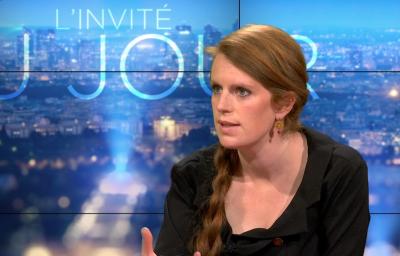

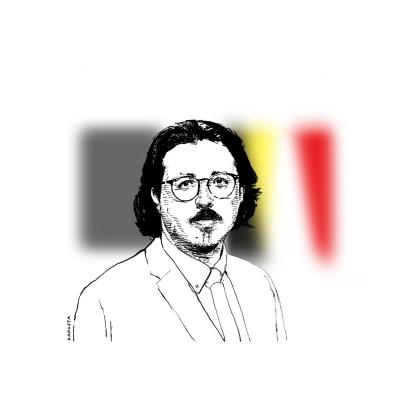


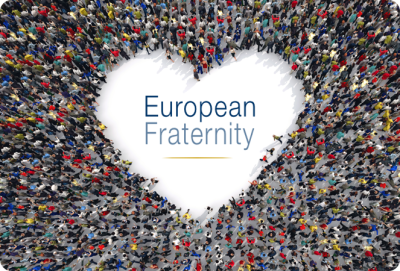

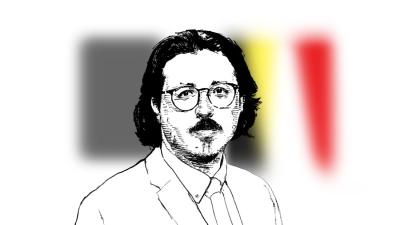

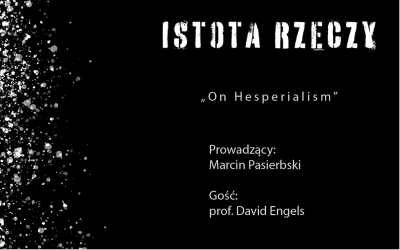

Comments (0)